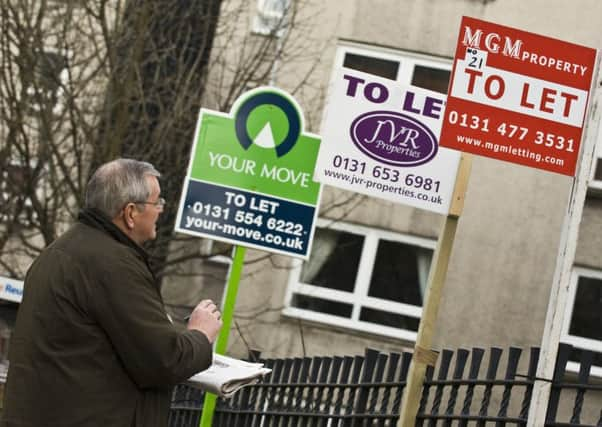Edinburgh rents rise 40 per cent in seven years


And although prices varied across the city, rent increases in all postcodes were well above inflation for the period - and rises appear to have accelerated since 2014.
The research, commissioned by Edinburgh’s Green councillors, showed that between 2010 and 2017, new rents for two-bedroom properties in Edinburgh rose by 39.8 per cent and three-bedrooms by 41.3 per cent at a time when inflation measured by the Consumer Price Index was 15.6 per cent.
Advertisement
Hide AdAdvertisement
Hide AdMeanwhile, it said, wages for the poorest 50 per cent of workers had risen by only 8.1 per cent in the period 2010-2016.
The Greens claimed the findings reinforced the case for declaring the whole of the Capital a Rent Pressure Zone (RPZ) which would limit future rent increases to inflation plus one per cent.
The analysis showed the EH3 postcode had the highest average rent for a two-bedroom property - and also the biggest percentage increase at 35.5, but even the lowest increase - in EH4 - was still 22.6 per cent.
The report said if rents had been capped at inflation plus one per cent between 2010 and 2017, they would have risen at not much over half the actual rise rate over the period.
Advertisement
Hide AdAdvertisement
Hide AdIt projected that if rents continued to rise at the same rate then, by 2020 one-bedroom properties would cost 56.2 per cent more to rent than in 2010, two-bedroom properties 61 per cent more and three-bedroom properties 62.8 per cent more.
And it said if the RPZ cap of inflation plus one per cent were applied now, tenants could be over £50 a month better off by 2020 than if no cap applied.
Green housing spokesperson Cllr Susan Rae said: “Edinburgh has the biggest and most expensive private rented sector in Scotland. With an expanding population and especially with so many young people who cannot get close to affording to buy a home, it’s been a bonanza time for private landlords.
“So it is time to rebalance that. The power to introduce a Rent Pressure Zone is a very modest step in the right direction but it shows the days of charging whatever the market allows are numbered.
Advertisement
Hide AdAdvertisement
Hide Ad“That is why I was delighted the council backed me in calling for an RPZ back in June. This report shows just how much Edinburgh’s tenants need it.”
Edinburgh saw a dramatic 16 per cent increase in its private rented sector between 2001 and 2014 to account for 29 per cent of the city’s housing market, while owner-occupied housing at 56 per is down 13 per cent.
The Capital was named the least affordable city in Scotland for house-buying.
Since 2010/11, private rents in Edinburgh have increased by around 4.9 per cent year-on-year, with the higher growth in more recent years.
Advertisement
Hide AdAdvertisement
Hide AdNicky Lloyd, head of lettings at ESPC, said: “Edinburgh has seen rental increases. In the last year the figure was an annual growth of 5.2 per cent. Glasgow and Aberdeen were about the same. The figure for Scotland was 1.5 per cent.
“Demand is still far outstripping the supply of property and the number of people coming into the city is what is leading to the increase in rents.
“It’s not that they are pricing people out of the market, it’s more associated with demand, especially one- and two-bedroom properties, that’s where the demand is highest - and the highest increases.”
She said if an RPZ were to be introduced in Edinburgh it would be more appropriate in areas of the city where reducing private-sector rents could reduce the pressure on social housing and allow people to stay in their community.
Advertisement
Hide AdAdvertisement
Hide AdHousing convener Councillor Gavin Barrie said the council was looking at an RPZ could be introduced.
“To make Edinburgh liveable for people on core earnings it is very important rents are kept at a reasonable level.”
But he said an RTZ was not necessarily a panacea because if landlords were prevented from putting rents up, they could go for short-term lets, where they would be able to raise rents between tenancies.
“That would add to the problem,” he said. “It’s something we need to look at very carefully.”